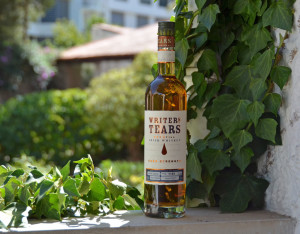Writer’s Tears Cask Strength Whiskey Review (2014)
By Richard Thomas
Rating: B+

(Credit: Richard Thomas)
The cask strength version of Writer’s Tears, the malt and pot still whiskey brand from Walsh Whiskey, is a pretty thing to behold. The bottle comes in a heavy, sliding wood case styled in such a way that it would be a natural fixture in any art deco revival setting. The packaging is pretty enough that the only major regret coming out of my November 2014 visit to Ireland was that I had to abandon that wooden box at the airport to get my luggage under the weight limit!
What is in the bottle is a pretty thing too. The difference between Writer’s Tears and its stablemate at Walsh, The Irishman, is that the former has more pot still whiskey than malt, whereas the latter is predominately malt. So, this is a predominately pot still blend, all triple distilled and aged in ex-bourbon barrels. That triple distilled part also automatically rules out Cooley as the source for any of the whiskey, since they are the double distillation stockists of the Emerald Isle.
The run for this installment of Writer’s Tears Cask Strength is 1,980 bottles, all at 53% abv.
The Whiskey
In the glass, this whiskey has the appearance of pure, clear, light-catching gold. The nose presents an oily, syrupy stew of pears and tart, green apples seasoned with eucalyptus and ginger, with trace notes of honey and vanilla. The dry spices jump out on the tongue initially, mellowing down into fruity, creamy, sweet spot. The finish starts spicy as well, but leaves a fruity, sweet aftertaste to trail off with the lingering warmth.
This is not a subtle whiskey, but cask strength releases rarely are. Instead, it’s big, flavorful and balanced. Fans of the spicy side of pot still whiskey should keep an eye out for either this or future Writer’s Tears Cask Strength releases.
The Price
This limited edition is still available at the time of writing (indeed, some 2013s are still out there) in Ireland and the UK, where it is priced at £100 and €145. Some online retailers in Germany have it marked much lower, though, down around the €100 mark.




